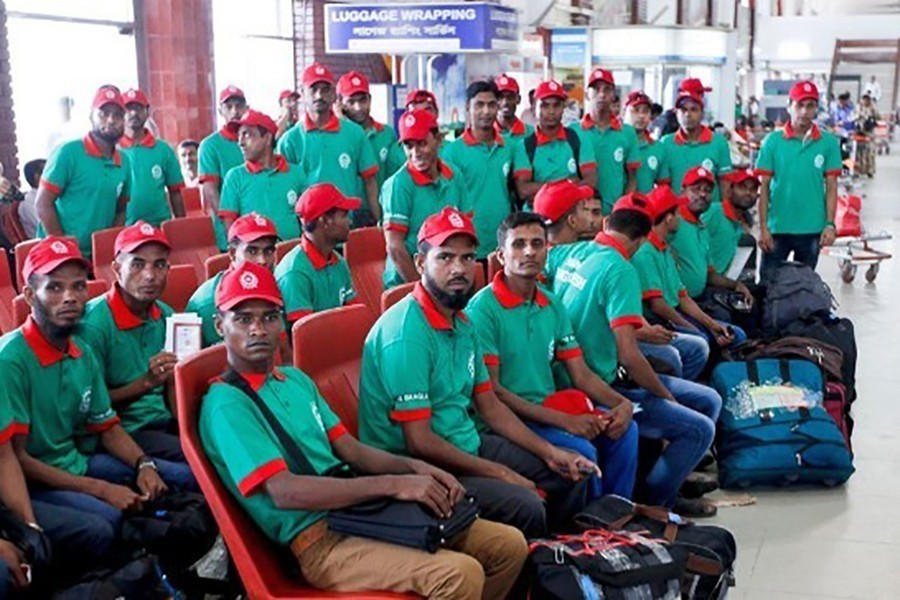'Bandhobi,' a Korean film directed by Shin Dong-il, stars a Bangladeshi migrant labourer as the main character. Bandhobi is primarily a love tale, but it also emphasises the hardships of migrant labourers in South Korean clothing manufacturers.
However, Bangladesh-born Korean superstar Mahbub Alam, popularly known as Mahbub Lee, is mostly unknown in his home country. He departed Bangladesh as a migrant worker, joined the Bangladeshi Labour Migration Community, and debuted as an actor in the Korean Film Industry.
People like Mahabub Alam are the true bridge Bangladesh-South Korea's robust bilateral relationship and reflect the growing importance of Bangladeshi migrants for both the host and sending countries.
South Korea is ranked as Bangladesh's 13th-highest source of remittances. South Korea accepted a record number of 5,891 Bangladeshi 'low and medium' skilled workers under its Employment Permit System (EPS) program in 2022.
After nearly a year and a half of not admitting international EPS workers owing to the COVID-19 outbreak, the Korean government started accepting ESP workers in December 2021.
From 2008 to 2022, a total of 28,697 Bangladeshi employees were sent to Korea under the EPS program, and it is predicted that 100 to 120 expatriate workers will be sent to Korea each week this year.
Korea is a popular choice for Bangladesh expatriate employees since they may receive Korea's legally guaranteed minimum salary. Currently, there are roughly 6,500 Bangladeshi labourers in Korea under this arrangement, down from more than 10,000 before the epidemic.
The number of remittances received by expatriate Bangladeshis in Korea hit a record high of USD 209 million in the fiscal year 2020-21.
In 2022, the Korean job quota for Bangladesh was 1,941. Because Bangladesh could meet the quota in a short period, the employing country upped the quota two more times.
Bangladesh has had a friendly connection with South Korea for many years, and the relationship has only grown stronger in recent years thanks to both countries' readiness to collaborate in various industries.
Against such a backdrop, growing labour migration in South Korea can be a game changer in bolstering their economic relations and sociocultural exchanges between people.
South Korea's domestic demand for labour
South Korea's Ministry of Interior and Safety reported on January 4 that the South Korean population has officially dropped for the first time, falling by 20,838 (0.04%) since 2019, bringing the 2020 total to 51,829,023.
The male population fell by 23,787 (0.09 per cent); the female population expanded, although at a slower pace of 0.01 per cent, 0.09 per cent less than the previous year.
South Korea's population reduction is a key contributor to the country's rising demand for immigration.
On the contrary, in Bangladesh, about 3 million people come into the workforce annually, while two million people are unemployed. South Korea establishes recruiting quotas based on the ranking of migrant-sending nations.
Bangladesh presently ranks seventh in terms of the number of employees sent to Korea and third in terms of the speed with which people are sent.
Bangladesh-South Korea relations
Notably, in June 2007, Bangladesh signed a Memorandum of Understanding (MoU) with South Korea on recruiting the workforce under a new agreement called EPS. Korea is an important source of remittance revenues for Bangladesh, as the bulk of Korean migrants transfer money through banking systems.
Bangladeshi migrants in Korea sent home remittances of USD 96.29 million in fiscal year (FY) 2017-18, USD 112.51 million in FY 2019-20, USD 209.16 million in FY 2020-21, and USD 135.46 million in FY 2021-22. Bangladesh has sent around 25,000 labourers to the Korean market thus far.
It is especially gratifying to observe an increase in Bangladeshi employees departing for South Korea under the country's Employment Permit System (EPS).
Additionally, looking at the volume of remittances that Bangladesh received in FY 2017-2018, one can see that it was more from South Korea than Japan.
Bangladesh received USD 22.89 million in FY 2017 and USD 31.44 million in FY 2018 from Japan. On the contrary, Bangladesh received USD 64.71 million in FY 2017 and USD 96.27 million in FY 2018 as remittance to South Korea.
South Korea has expressed fresh interest in hiring Bangladeshi workers in the aftermath of a new regulation enacted by Bangladeshi authorities. The export of skilled labour has been a significant pillar in the creation of our bilateral ties with South Korea, and it may continue to be so if both sides take the proper approach.
The steadily rising flow of remittances from Bangladesh migrants abroad provides a welcome relief amidst the ongoing global financial crisis caused by the pandemic and Ukraine war. Besides, illegal worker migration to the nation will be prevented, and workers will no longer run once they arrive.
Promoting people-to-people contacts
In the aftermath of the global financial crisis, the South Korean labour market proved to be robust. Migrant workers contribute to the growth and development of their destination nations, while their countries of origin gain significantly from them.
Migrant workers contribute to the growth and development of their destination nations, while their countries of origin gain immensely from their remittances and the skills acquired throughout their migration experience.
In the current age of globalisation, migration may be defined as a process in which individuals from various origins, localities, cities, and states interact culturally, promoting people-to-people interactions.
South Korea draws thousands of foreign, low-skilled labourers, particularly from other South Asian nations, as its population ages fast. These encouraging figures attest to the potential reciprocal benefits of our partnership with South Korea.
Given the growing demand for migrant workers and the resulting employment prospects in the nation, we would be wise to upskill more workers to have a more skilled expat labour base.
Meanwhile, we must guarantee that suitable rules are in place in Korea to safeguard the safety and well-being of our workers.
The writer is a research associate at the Centre for Bangladesh and Global Affairs


